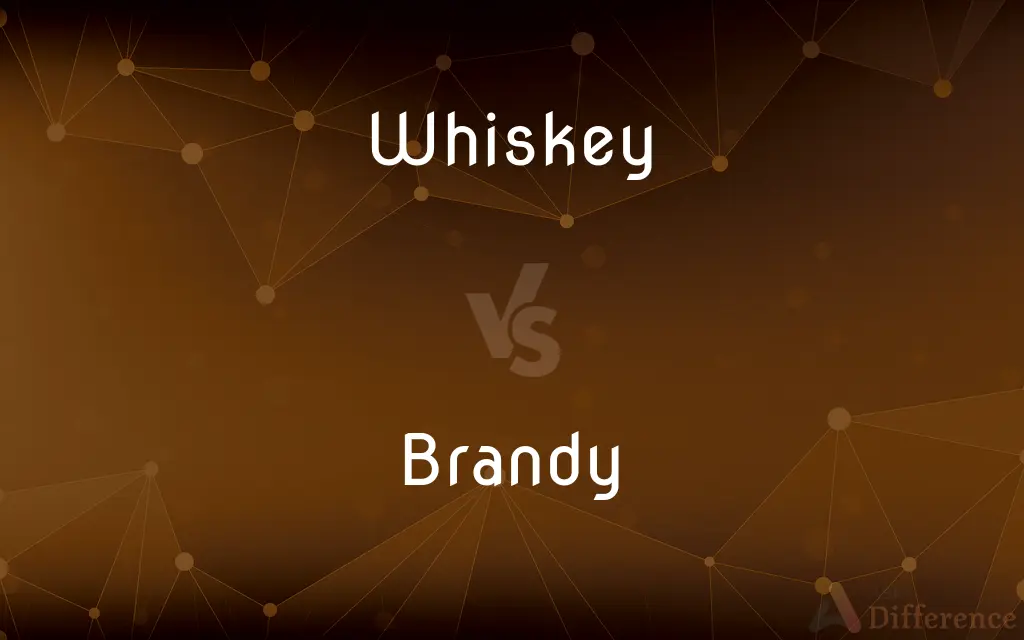Whiskey vs. Brandy — What's the Difference?
By Fiza Rafique & Urooj Arif — Updated on March 25, 2024
Whiskey is a distilled alcoholic beverage made from fermented grain mash, while brandy is distilled from wine or fermented fruit juice, each embodying distinct flavors and cultural traditions.

Difference Between Whiskey and Brandy
Table of Contents
ADVERTISEMENT
Key Differences
Whiskey is known for its rich variety, derived from different grains such as barley, corn, rye, and wheat, which contribute to its diverse flavor profiles. These grains are fermented, distilled, and then aged in wooden barrels, a process that imbues whiskey with its distinctive taste and character. On the other hand, brandy is primarily made by distilling wine, which can come from a wide range of fruits, but most commonly grapes. The aging process in wooden casks enhances its flavor, aroma, and smoothness, leading to a spirit that is often enjoyed as a digestif.
The origin of whiskey can be traced back to Scotland and Ireland, with each region developing its unique styles, such as Scotch, Irish whiskey, and Bourbon, reflecting the cultural preferences and distillation practices of each area. Whereas brandy has a more varied history, with notable varieties like Cognac and Armagnac from France, and Pisco from South America, showcasing the global spread and adaptation of brandy production to local tastes and fruit availability.
Whiskey is typically characterized by its warm, complex flavors, which can range from smooth and mellow to rich and peaty, depending on the type and duration of aging. It is often consumed neat, on the rocks, or as part of various cocktails. Brandy, however, tends to have a sweeter, fruitier profile with a smoother finish, making it popular both in its pure form and as a key ingredient in classic cocktails like the Sidecar.
The production process for whiskey involves strict regulations, especially for types like Scotch and Bourbon, which have specific requirements regarding the ingredients, distillation process, and aging. Brandy's production also follows certain regulations, particularly for varieties like Cognac and Armagnac, which must meet specific criteria related to the fruit used, distillation methods, and aging processes to bear their respective names.
Choosing between whiskey and brandy often comes down to personal preference, with some people drawn to the robust, grain-based flavors of whiskey, while others prefer the smooth, fruity notes of brandy. Both spirits offer a wide range of flavors, ages, and price points, catering to a diverse audience of spirit enthusiasts.
ADVERTISEMENT
Comparison Chart
Base Ingredient
Fermented grain mash (barley, corn, rye, wheat)
Wine or fermented fruit juice, mainly grapes
Origin
Scotland, Ireland, United States, etc.
France, Spain, South America, etc.
Flavor Profile
Warm, complex, can be smoky or peaty
Sweeter, fruitier, smoother
Notable Varieties
Scotch, Irish whiskey, Bourbon, Rye
Cognac, Armagnac, Pisco, Fruit brandies
Consumption
Neat, on the rocks, in cocktails
Neat as a digestif, in cocktails
Aging Process
Aged in wooden barrels, often oak
Aged in wooden casks, often oak or other woods
Regulations
Specific rules for Scotch, Bourbon, etc.
Specific rules for Cognac, Armagnac, etc.
Cultural Significance
Reflects the traditions of its region of origin
Reflects the fruit-growing and winemaking traditions
Compare with Definitions
Whiskey
Originates from Scotland, Ireland, and beyond.
Irish whiskey is celebrated for its smoothness and lightness.
Brandy
Often enjoyed as a digestif.
They concluded the meal with a smooth glass of brandy.
Whiskey
Often aged in oak barrels for varied flavors.
The whiskey's rich amber color hinted at its long aging process.
Brandy
A spirit distilled from wine or fruit juice.
The brandy was distilled from fine French grapes.
Whiskey
A distilled spirit made from fermented grain mash.
He savored a glass of aged Scotch whiskey by the fireplace.
Brandy
Includes varieties like Cognac and Armagnac.
The Cognac had a complex bouquet, aged to perfection.
Whiskey
Consumed neat, on the rocks, or in cocktails.
She mixed a classic whiskey sour for the party.
Brandy
Known for its fruit-based sweetness.
The pear brandy captured the fruit's essence beautifully.
Whiskey
Varieties include Scotch, Bourbon, and Rye.
Bourbon whiskey is known for its smooth, sweet flavor.
Brandy
Has a global presence with regional specialties.
Pisco, a type of brandy from South America, is popular in cocktails.
Whiskey
An alcoholic liquor distilled from grain, such as corn, rye, or barley, and containing approximately 40 to 50 percent ethyl alcohol by volume.
Brandy
Brandy is a liquor produced by distilling wine. Brandy generally contains 35–60% alcohol by volume (70–120 US proof) and is typically consumed as an after-dinner digestif.
Whiskey
A drink of such liquor.
Brandy
An alcoholic liquor distilled from wine or fermented fruit juice.
Whiskey
A liquor distilled from the fermented mash of grain (as rye, corn, or barley).
Brandy
To preserve, flavor, or mix with brandy.
Whiskey
A drink of whiskey.
Brandy
(uncountable) An alcoholic liquor distilled from wine or fermented fruit juice.
Whiskey
(historical) A light gig or carriage; a tim-whiskey.
Brandy
(countable) Any variety of brandy.
Whiskey
(international standards) nodot=1 NATO/ICAO Phonetic Alphabet.}}
Brandy
(countable) A glass of brandy.
Whiskey
Same as Whisky, a liquor.
Brandy
(transitive) To preserve, flavour, or mix with brandy.
Whiskey
A light carriage built for rapid motion; - called also tim-whiskey.
Brandy
A strong alcoholic liquor distilled from wine. The name is also given to spirit distilled from other liquors, and in the United States to that distilled from cider and peaches. In northern Europe, it is also applied to a spirit obtained from grain.
Whiskey
A liquor made from fermented mash of grain
Brandy
Distilled from wine or fermented fruit juice
Common Curiosities
Is one stronger than the other in terms of alcohol content?
Generally, both have similar alcohol content, typically around 40% ABV, but this can vary depending on the specific product.
Which is sweeter, whiskey or brandy?
Brandy is typically sweeter than whiskey due to its fruit-based origins.
How long should whiskey and brandy be aged?
Aging varies by type; some whiskeys and brandies are aged for just a few years, while others may be aged for decades to develop their flavor.
Are there health benefits to drinking whiskey or brandy in moderation?
Moderate consumption of any alcohol, including whiskey and brandy, may have certain health benefits, but excessive drinking is harmful.
Can whiskey and brandy be aged the same way?
Both are aged in wooden barrels, but the type of wood and aging process specifics can vary, affecting their flavors differently.
Can whiskey and brandy only be made in certain regions?
While some types have geographic restrictions (like Scotch or Cognac), whiskey and brandy can be made anywhere, adhering to general production methods.
What's the main difference between whiskey and brandy?
The main difference lies in their base ingredients; whiskey is made from fermented grain mash, while brandy is distilled from wine or fermented fruit juice.
Can I substitute whiskey for brandy in cooking?
While you can substitute them, the flavor profile of your dish will change, with whiskey offering a robust, grainy taste and brandy a sweeter, fruitier note.
Why is brandy often served in a snifter?
The snifter's design helps concentrate the aroma of brandy, enhancing the tasting experience.
What makes Scotch whisky different from other whiskeys?
Scotch whisky is made in Scotland from malted barley or grain, with distinctive flavors from the Scottish environment and peat used in the malting process.
What's the best way to enjoy whiskey and brandy?
Personal preference dictates enjoyment; some prefer them neat or on the rocks, while others enjoy them in cocktails or as a digestif.
Share Your Discovery

Previous Comparison
Bull vs. Ox
Next Comparison
Look vs. WatchAuthor Spotlight
Written by
Fiza RafiqueFiza Rafique is a skilled content writer at AskDifference.com, where she meticulously refines and enhances written pieces. Drawing from her vast editorial expertise, Fiza ensures clarity, accuracy, and precision in every article. Passionate about language, she continually seeks to elevate the quality of content for readers worldwide.
Co-written by
Urooj ArifUrooj is a skilled content writer at Ask Difference, known for her exceptional ability to simplify complex topics into engaging and informative content. With a passion for research and a flair for clear, concise writing, she consistently delivers articles that resonate with our diverse audience.














































